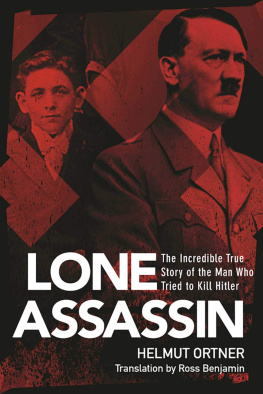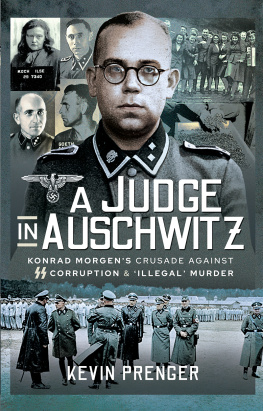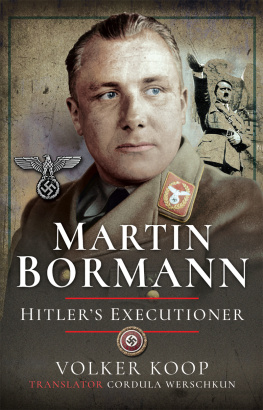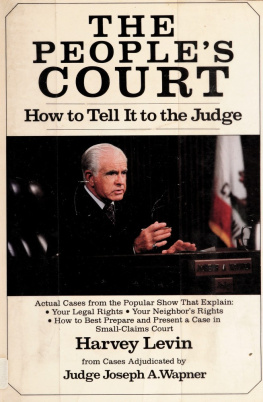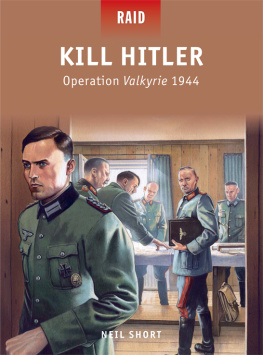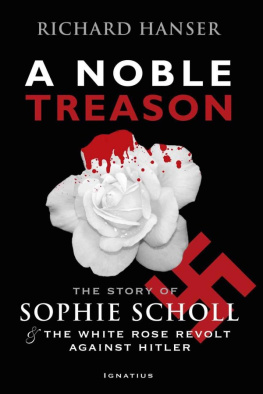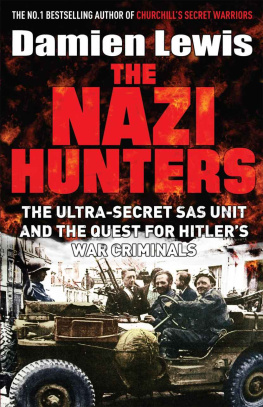HITLERS EXECUTIONER
HITLERS EXECUTIONER
JUDGE, JURY AND MASS MURDERER FOR THE NAZIS
HELMUT ORTNER TRANSLATED BY SUSAN HAYNES-HUBER
HITLERS EXECUTIONER
Judge, Jury and Mass Murderer for the Nazis
This English edition published in 2018 by Frontline Books,
an imprint of Pen & Sword Books Ltd, Yorkshire - Philadelphia
Copyright Helmut Ortner, 2018
ISBN: 978-1-47388-939-2
eISBN: 978-1-47388-941-5
Mobi ISBN: 978-1-47388-940-8
The right of Helmut Ortner to be identified as Author of this work has been asserted by him in accordance with the Copyright, Designs and Patents Act 1988. A CIP catalogue record for this book is available from the British Library All rights reserved.
No part of this book may be reproduced or transmitted in any form or by any means, electronic or mechanical including photocopying, recording or by any information storage and retrieval system, without permission from the Publisher in writing.
Pen & Sword Books Ltd incorporates the imprints of Pen & Sword Archaeology,
Air World Books, Atlas, Aviation, Battleground, Discovery, Family History, History,
Maritime, Military, Naval, Politics, Social History, Transport, True Crime, Claymore
Press, Frontline Books, Praetorian Press, Seaforth Publishing and White Owl
For a complete list of Pen & Sword titles please contact:
PEN & SWORD BOOKS LTD
47 Church Street, Barnsley, South Yorkshire, S70 2AS, UK.
E-mail:
Website: www.pen-and-sword.co.uk
Or
PEN AND SWORD BOOKS,
1950 Lawrence Road, Havertown, PA 19083, USA
E-mail:
Website: www.penandswordbooks.com
The German perpetrator was not a special kind of German. What we have to say about his convictions applies not only to him, but to Germany as a whole.
Raul Hilberg
No, what happened in the past is not absent from the present simply because it is past.
Alfred Grosser
List of Plates
Roland Freisler, the President of the Volksgerichtshof, photographed on 1 September 1942. (Bundesarchiv, Bild 183-J03238/CC-BY-SA 3.0)
Roland Freisler, the laywer, with one of his clients, Otto Strasser, in 1930. (Author)
The inaugural gathering of Prussian law clerks at a camp in Jterbog, north-eastern Germany, in 1933. (Bundesarchiv, Bild 183-H26606/CC-BY-SA 3.0)
The inauguration of the newly-appointed Attorney General, Heinrich Lautz, at the District Court in Berlin, on 31 August 1936. (Bundesarchiv, Bild 183-H25930/CC-BY-SA 3.0)
The four men who imposed Nazi ideology on the German legal system. (Bundesarchiv, Bild 183-J03166/CC-BY-SA 3.0)
The Reich Minister of Justice, Otto Georg Thierack (on the right), greets the new President of the Peoples Court, Roland Freisler, in his office at the end of August 1942. (Bundesarchiv, Bild 183-J03230/CC-BY-SA 3.0)
The opening of a session of the Volksgerichtshof, for the trials of those involved in the 20 July 1944 assassination attempt on Adolf Hitler. (Bundesarchiv, Bild 151-39-23/CC-BY-SA 3.0)
Roland Freisler during the 20 July 1944 trials. (Bundesarchiv, Bild 151-17-15 and Bild 151-29-35/CC-BY-SA 3.0)
Dr Carl Friedrich Goerdeler, the former Mayor of Leipzig, speaking during his trial for his involvement in the 20 July plot. (Bundesarchiv, Bild 151-58-16/CC-BY-SA 3.0)
Roland Freisler faces a witness as the latter gives the Nazi salute on entering the Volksgerichtshof during the trial of the 20 July plotters. (Bundesarchiv, Bild 151-10-11/CC-BY-SA 3.0)
Another of the accused in the 20 July trials, Carl Wentzel, appears before Roland Freisler. (Bundesarchiv, Bild 151-53-30A/CC-BY-SA 3.0)
Ferdinand Freiherr von Lninck appearing before the Volksgerichtshof for his part in the 20 July plot. (Bundesarchiv, Bild 151-52-31A/CC-BY-SA 3.0)
Roland Freisler discussing plans of the Wolfsschanze complex during the trials after the 20 July plot. (Author)
The ruins of the Volksgerichtshof, photographed in 1951. (Bundesarchiv, B145 Bild-P054489/CC-BY-SA 3.0)
A memorial plaque on the site of the Volksgerichtshof.
Foreword
The Presence of the Past
W hile I was working on this book, people often asked me whether it still made sense to talk about our National Socialist past today. Some of these people were acquaintances who think that our history now really is history. Others were friends who argue that we have to close the book sometime, even on such a horrific past as ours.
I pointed out that most Germans and I am not talking about the older generation here still refuse to believe what their fathers and grandfathers did and what they allowed to happen between 1933 and 1945. I used examples to illustrate the collective and individual attempts which have been made to escape this dark past. The reaction I received was frequently doubt, incomprehension, sometimes even protest. Not everyone was a Nazi, they said, not everyone committed crimes, and the Germans were not the only ones who had committed atrocities. To me, this stank of justification, the repression of guilt.
One thing is certain: on Day One after Hitler, many people in Germany were filled with shame and grief over what had happened in the preceding years. However, it is a sad fact that there were far more who, hardly had the nightmare ended, were already repressing what they had seen and experienced instead of accepting it into their consciousness as their own history. An entire people was trying to escape its past. That was then and now?
Is the post-war generation, the generation to which I belong and which, to put it in the words of former German chancellor Helmut Kohl, enjoyed the mercy of late birth, now eager to draw a line under a dark but not too distant past? Is this politically and morally innocent generation now finally released from its obligation to face the Hitler regime and its inheritance? Or: does the responsibility of the members of this generation not begin with the question of where they stand with regard to the guilt of their grandparents and parents? With the question of whether they want to remember?
This book is about guilt and atonement, failure and cowardice. It is about courage, uprightness and resistance. It is a book about perpetrators and victims, repression and denial and about remembering.
The main subject of this book is one particularly monstrous Nazi institution, one which could not have existed without the willing support and active compliance of legal professionals the Volksgerichtshof (Peoples Court). It has received extensive historical, political, legal and journalistic coverage as has the legal system in the Third Reich in general. Interested readers can trace the fatal course of jurisprudence in Hitlers Germany from its euphoric beginnings to its destructive end. Yet, despite the many works written by historians about the creation, structure, function and everyday workings of the Volksgerichtshof, there is very little literature on the life and work of Roland Freisler. It is with his name that the cruellest era of this tribune of terror is associated.


